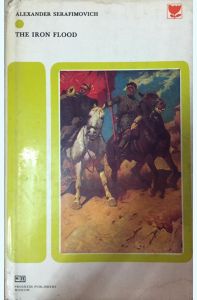The Iron Flood: a Novel
'The Iron Flood' is a harsh story. It is set during the Civil War, and depicts the accomplishment of an impossible task. A great number of Red soldiers and their families are cut off from their main forces, and set out to break through the surrounding White armies to join them. A heroic march starts, and the only way to carry it through is by iron will and steel discipline.
Serafimovich's prose is filled with fascinating exaggerations: for instance, the earth of the steppe is described as so fat that you could spread it on your bread like brown butter. There are some rather disturbing things in the story, like a White colonel contemplating whether he should or should not send after 'the Greek girl' (which is artistically uninspired and apparently only done to exaggerate the White army's corruption), and also the struggle between the Anarchist sailors accompanying the march, and the 'true Communists'. But apart from these mostly propagandistic traits, there are many memorable and well-written passages, like, for example, a scene of the camp at night, when everything is dark, and a horse is a big, warm shadow, and the glow of a cigarrette lights up bits of the characters; or the tale of the leader Koshukh's time in the army during the World War; or a scene, where the troups encounter the corpses of four comrades, tortured and hanged by the White army.
The tone of the story is very hard and cruel. It is filled with the despair and hopelessness of these desperate people who are bound to get killed if they stay, and at the same time very likely to die from exhaustion if they walk on without rest. But Koshukh, the man with the Iron Jaws and Steelen Eyes, and the only one able to summon the people to discipline, will not allow them to give up. They must continue walking, day and night, through storm and heat, without food nor water, battling White forces whenever they come across them, and they WILL catch up with the Red army. And (of course) they do.
The ending is rather predictable, but the road to it is, nonetheless, captivating.
This is a classic of Socialist realism. Yet, there are a number of better books in the genre, like the works of Gorky and Sholokhov, which I can recommend far warmer.
Product details
- Hardcover
- Publisher: Progress Publishers (1974)



































